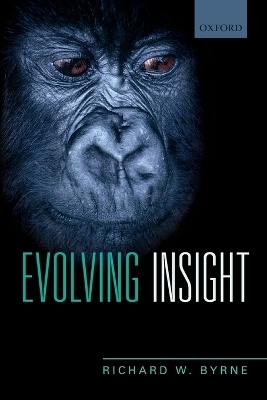
Evolving Insight
Oxford University Press (Verlag)
978-0-19-875707-8 (ISBN)
'Insight' is not a very popular word in psychology or biology. Popular terms-like "intelligence", "planning", "complexity" or "cognitive"- have a habit of sprawling out to include everyone's favourite interpretation, and end up with such vague meanings that each new writer has to redefine them for use. Insight remains in everyday usage: as a down-to-earth, lay term for a deep, shrewd or discerning kind of understanding. Insight is a good thing to have, so it's important to find out how it evolved, and that's what this book is about.
Coming 20 years after publication of Richard Byrne's seminal book The Thinking Ape, Evolving Insight develops a new theory of the evolutionary origins of human abilities to understand the world of objects and other people. Defining mental representation and computation as 'insight', it reviews the evidence for insight in the cognition of animals.
The book proposes that the understanding of causality and intentionality evolved twice in human ancestry: the "pretty good" understanding given by behaviour parsing, shared with other apes and related to cerebellar expansion; and the deeper understanding which requires language to model and is unique to humans. However, Ape-type insight may underlie non-verbal tests of intentionality and causal understanding, and much everyday human action.
Accessible to those with little background in the topic, Evolving Insight is an important new work for anyone with an interest in psychology and the biological sciences.
Richard Byrne studies the evolution of cognitive and social behaviour, particularly the origins of distinctively human characteristics. Current projects focus on the gestural communication of the great apes, and on the social cognition of the African elephant. Previous work has included tactical deception in primates and its relationship to brain size and intelligence, welfare-related studies of cognition in the domestic pig, and the analysis of social learning and imitation. " Professor Byrne was awarded the British Psychology Society Book Award 1997 for his O.U.P. monograph "The Thinking Ape
1: Introduction: What is insight, and why care about its evolution?
2: Why are animals cognitive?
3: Vocal communication in primates
4: Gestural communication in great apes
5: Understanding others: reacting to what others see and know
6: Understanding others: reacting to what others see and know
7: Learning from others: cultural intelligence?
8: Theory of mind: understanding how others think and what they know
9: Pivot Point: From social to technical abilities
10: Knowledge about the physical world
11: Learning new complex skills
12: A road map to insight
| Erscheinungsdatum | 29.02.2016 |
|---|---|
| Verlagsort | Oxford |
| Sprache | englisch |
| Maße | 164 x 233 mm |
| Gewicht | 348 g |
| Themenwelt | Geisteswissenschaften ► Philosophie |
| Geisteswissenschaften ► Psychologie ► Allgemeine Psychologie | |
| Geisteswissenschaften ► Psychologie ► Entwicklungspsychologie | |
| Geisteswissenschaften ► Psychologie ► Psychoanalyse / Tiefenpsychologie | |
| Geisteswissenschaften ► Psychologie ► Verhaltenstherapie | |
| Naturwissenschaften ► Biologie ► Evolution | |
| Naturwissenschaften ► Biologie ► Zoologie | |
| ISBN-10 | 0-19-875707-7 / 0198757077 |
| ISBN-13 | 978-0-19-875707-8 / 9780198757078 |
| Zustand | Neuware |
| Haben Sie eine Frage zum Produkt? |
aus dem Bereich


